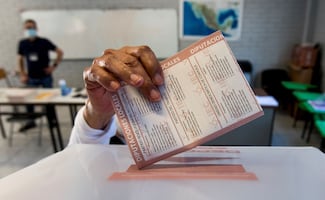Más Información

Reportan que AICM opera con normalidad; van 58 vuelos cancelados y 11 demorados por violencia en Jalisco

Reforma electoral de Sheinbaum vuelve a atorarse por desacuerdo de PT y PVEM; reducción de pluris y recorte dividen a la coalición

Sheinbaum afina reforma electoral con líderes de Morena y PVEM; prevé enviar iniciativa a Diputados como cámara de origen
Mexico’s Public Education Ministry (SEP) informed Wednesday that the return to academic activities after the pandemic will take place through a hybrid model with in-class and online classes.
“The pedagogical perspective that will persist in the future will be a hybrid model that will involve both remote education and in-class education, according to the needs of each of the state education systems,” said the SEP’s minister Esteban Moctezuma.
The officer, who led the virtual 49th edition of the Ordinary Meeting of the National Council of Education Authorities, said that in the new hybrid model , “national teachers, as always, are irreplaceable.”
He explained that during the pandemic, that lasted through the last part of the 2019-2020 school year “there were many obstacles to face” and recognized that most students, from all educational levels, “continued and concluded their learning” although he did not mention numbers.
Recommended:
Nine measures
Moctezuma reminded the state education ministers that there will be “nine intervention or measures to ensure the well-being of the school community” (students, teachers, directives, and parents) when they resume in-person classes “as long as Mexico’s four-color epidemiological system” is in green, and according to the evolution of the pandemic in each state.”
He mentioned that the first measure will be to actívate the school health participation committees, most of which were established before the suspension of classes; the second measure will be ensuring the access to wáter and soap at schools .
The third measure is to look after teachers, mainly those who are in risk groups, so the SEP will sign an agreement with the ISSSSTE to promote their access to health services and medical care.
The fourth will be the general and proper use of face masks at all schools; the fifth is linked to practicing physical distancing at entrances, exits, and during recess, which must be tiered, and the alternated attendance to school.
The sixth measure will be to maximize the use of open space; the most they are used at schools, the better; the seventh measure is the suspension of any activity that causes gatherings at schools .
Meanwhile, the eighth measure will be to establish the early detection of cases; a school will be closed for 15 days with a single case of COVID-19 . The ninth measure will be the socio-emotional support to teachers and students.
Recommended:
Healthy Life, new subject
In addition, the officer said that the adaptation and change requirements demanded by the current situation in the country led to the creation of a new subject: Healthy Life.
He explained that the main objective of this new subject “is to generate a change in the lifestyle of Mexicans, as well as a cultural change that modifies consumption patterns.
“The pandemic has taught us that there are chronic-degenerative diseases such as diabetes and hypertension, that are the result of a poor diet and the lack of physical activity,” he said.
Last Friday, Mexico’ COVID-19 czar Hugo López-Gatell, questioned the poor diet that has been taking place in Mexico during the last decades and that has caused diseases that, combined with COVID-19, have caused over 41,000 deaths in the country during the pandemic.
“Why do we need bottled venom, that of sodas? Why do we need donuts, cakes, chips that are a toxic diet and that contaminate the environment?” he said in his daily news briefing.
Mexico’s President Andrès Manuel Lòpez Obrador has also asked the population to have a healthy diet and to give priority to natural food over industrialized food.
On Wednesday, Mexico’s Health Ministry reported 790 new COVID-19 related deaths and 6,019 new infections for a total of 41,190 deaths and 362,274 confirmed cases since the beginning f the pandemic in Mexico on February 28.
mp
Noticias según tus intereses
[Publicidad]
[Publicidad]











